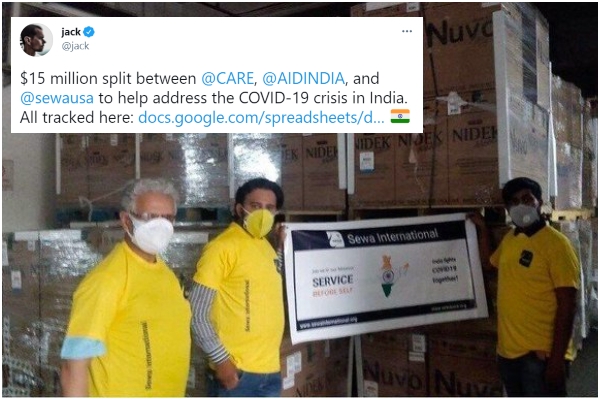Twitter owner, Jack Patrick Dorsey donates $2.5 million to Sewa International USA help address India's COVID-19 crisis
Total Views |
New Delhi, May 11: Jack Patrick Dorsey, an American technology entrepreneur and philanthropist whom we know as co-founder and the CEO of the Twitter has in a mode to COVID-19 service donated $2.5 million to Sewa International USA to help address the COVID-19 crisis in India. He further has donated $10 million to care.org and another $2.5 million to Association for India's Development to tackle the COVID crisis in India.

"$15 million split between care.org, AIDIndia and Sewa International USA to help address the COVID-19 crisis in India", Jack tweeted sharing a detailed excel sheet named #startsmall tracker. Sewa International is a Hindu faith-based, humanitarian, nonprofit service organization. "This grant will support the procurement of lifesaving equipment such as oxygen concentrators, ventilators, BiPap, and CPAP machines as part of Sewa International's “Help India Defeat COVID-19” campaign. Equipment will be distributed to government hospitals and COVID-19 care centers and hospital", the sheet read.
Further, CARE is a leading humanitarian organization fighting global poverty. $10 million grant is to support CARE's urgent action to help address the deadly second wave of COVID-19 infections devastating India. As reported, these funds are to be used to supplement government efforts by setting up temporary COVID-19 care centers; providing oxygen, PPE kits, and other critically needed emergency supplies for frontline health workers; and addressing vaccine hesitancy and helping ensure that people get vaccinated, particularly in remote, marginalized communities in India.
Association for India's Development (AID) is a volunteer movement promoting sustainable, equitable, and just development. AID partners with grassroots organizations in India on interconnected areas of education, health, agriculture, livelihoods, environment, and human rights. This grant will help under-resourced communities identify COVID symptoms, prevent spread, access care and treatment, benefit from medical equipment including oxygen, oximeters, thermometers, protective gear and vaccination, survive lockdowns, regain livelihoods and will strengthen hospitals and NGOs that serve rural and low-income communities.
.
.